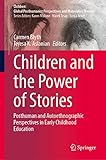Children and the power of stories : posthuman and autoethnographic perspectives in early childhood education / Carmen Blyth, Teresa K. Aslanian, editors
Material type: TextSeries: Children (Springer (Firm))Publisher: Singapore : Springer, [2022]Copyright date: ℗♭2022Description: 1 online resource : illustrations (chiefly color)Content type:
TextSeries: Children (Springer (Firm))Publisher: Singapore : Springer, [2022]Copyright date: ℗♭2022Description: 1 online resource : illustrations (chiefly color)Content type: - text
- computer
- online resource
- 9789811692871
- 9811692874
- 372.21 23
- LB1042 .C55 2022
| Item type | Current library | Shelving location | Call number | Status | Date due | Barcode |
|---|---|---|---|---|---|---|
 Books
Books
|
Dato Maznah Library & Information Services | L Education | LB1042.C55 2022 (Browse shelf(Opens below)) | Available | 00001647 |
Browsing Dato Maznah Library & Information Services shelves, Shelving location: L Education Close shelf browser (Hides shelf browser)
Includes bibliographical references and index
Preface -- Storytelling the Multiple Self: Posthuman Autoethnography as Critical Praxis -- Storying into Resistance: The Use of Purposeful Placement Stories -- The Green Foam Ring and the Sleeping Girl Who Wasnt Tired: A Posthuman Story of Care -- Storying Observations of a Cardboard-book through Sticky Micro-moments, BagLadyCarrierBag Practices and Memory Stories -- From Multispecies Tangles and Anthropocene Muddles: What can Lichen Teach Us About Precarity and Indeterminacy in Early Childhood? -- Storyplay Time at School: Neoliberal and Neocolonial Assemblages in Early Childhood Education -- Storying Other th/an/d Neoliberal CriticismCause I have a Hunch of Something Being Wrong Here -- Nick-storying and the Body's Immersion and Participating in the World: Forming Aggregates for Early Childhood Education -- Stories, Places: Storied Place and Placed Story -- An Ethics of Flourishing: Storying Our Way Around the Power/Potential Nexus in Early Childhood Education and Care -- Afterword -- Index
Available to OhioLINK libraries
This book explores how stretching stories through posthuman and autoethnographic perspectives can produce new stories that decolonialize traditional thinking and approaches to Early Childhood Education (ECE). It demonstrates how stories can provide a different way of knowing, and a way of knowing differently: a way of decolonializing current discourses of early childhood education within educational institutions. The book uses research and practice in ECE to act as a canvas, a context with which to explore how autoethnography can become other when viewed through a posthumanist lens. As a consequence the chapters and stories within allow for an interplay between the posthumanist and the autoethnographic, an interplay that allows for a very specific type of meaning to emerge; a meaning that traffics in numerous and disruptive possibilities rather than settled certainties. In so doing, authors rethink and perturb the notion of child-centered approaches to knowing, be(com)ing, and doing within the Early Childhood Education









There are no comments on this title.